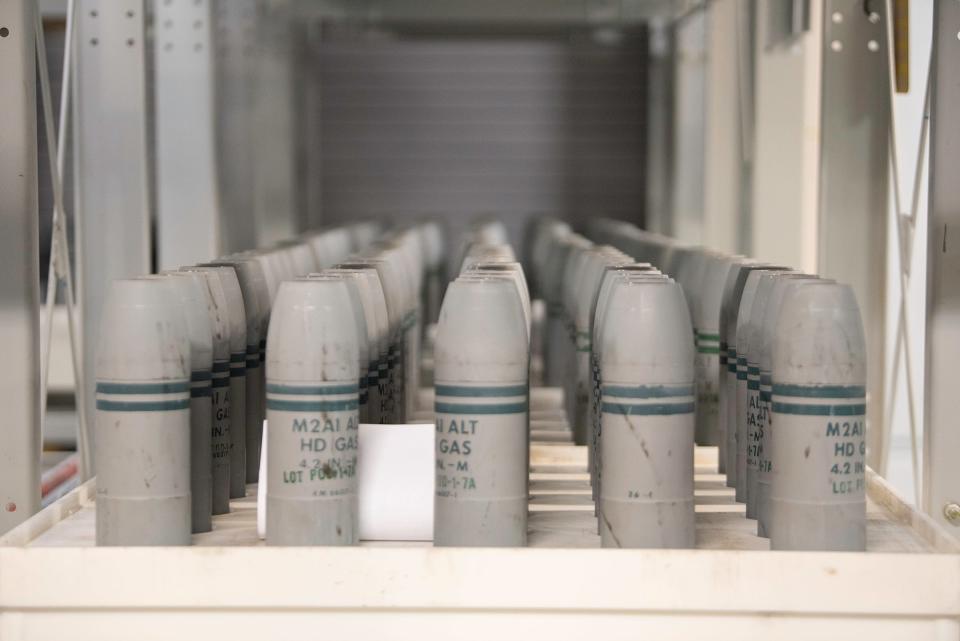Closure of the Pueblo Chemical pilot plant could take longer than planned. Here's why
Closure of the Pueblo Chemical Agent-Destruction Pilot Plant will likely take significantly longer than originally expected.
PCAPP project managers indicated earlier this year that the closure process could wrap up in December 2025, but it will likely take much longer, said Irene Kornelly, chair of the citizens’ advisory commission that has kept track of the Pueblo facility.
A permit to begin the closure process has yet to be approved by the Colorado Department of Public Health and Environment. The state agency is working with PCAPP and the Pueblo Chemical Depot to add “required information to their respective closure plans,” Venissa Ledesma, communications specialist for CDPHE, told the Chieftain.
CDPHE didn’t provide an estimate on when the plans might be approved. It is reviewing plans for permits that cover PCAPP and the 22,000 acres of the Pueblo Chemical Depot Army installation, Ledesma said.
Sandy Romero, communications manager for the Bechtel Pueblo team that led the destruction of the facility’s chemical weapons supply, said Wednesday they anticipate approval coming after Jan. 1, 2024, at which point they will begin the first phase of the closure process. The team estimates the closure could occur in May 2026.
During the closure phase, operations are expected to include, “disposal of all secondary wastes, decontamination and decommissioning of facilities and equipment, disposition of property, demolition of certain facilities and closure of government contracts and environmental permits in accordance with laws and regulations,” according to PCAPP.
During an October board of health meeting, Kornelly said that the goal of the closure process is “total elimination, if possible, of all the toxic chemicals” present at the facility. She noted that the state health department wants to avoid a repeat of what happened at Rocky Mountain Arsenal, a former chemical weapons manufacturer.
“(The closure) is not going to happen quickly,” Kornelly said. “We can’t do it until parts of it are clean or sure that it’s clean enough. And 'clean enough' has to be that if you had to drill a hole, you’re not going to be infected and become ill as a result.”
Waste disposal practices that were used at the Arsenal site resulted in “extensive soil, surface water, sediment, groundwater and structures contamination, damage to trees and vegetation and death to wildlife.” Contaminant ground water was discovered to have migrated off site in the 1950s.

Ledesma said CDPHE’s ultimate goal is “clean closure,” meaning all structures and equipment at the facility are decontaminated, safe to reuse or demolished. The agency also wants to verify that the surrounding environment isn’t contaminated because of “decontamination or demolition activities.”
“We would like to avoid any releases to the surrounding environment as a result of closure activities,” she said. “We are committed to ensuring that human health and the environment are protected both on and off of the facility.”
There have been no known releases from the chemical weapons stockpile treatment and disposal process, Ledesma said. In June, the last shell containing mustard agent at the Pueblo Chemical Depot was destroyed, ending a years-long process to dismantle an extensive stockpile of chemical weapons at the facility.
Soil and groundwater investigations and active remediation and monitoring are ongoing. CDPHE is most concerned with nitrates and solvents contaminating soil and groundwater near the Pueblo Chemical Depot’s solid waste management units, Ledesma said.
The site is expected to be repurposed for industrial use once the closure is complete, according to PuebloPlex. Kornelly said it’s highly unlikely that housing will ever be constructed in the area.
There will likely be a mass loss of jobs at the facility during the closure process, Kornelly said, though at least half of the workers expressed an interest in staying in Pueblo. There are also efforts to “reskill and reemploy” some of the workers, said Russell DeSalvo, president and CEO of PuebloPlex.
“It’s been a big push to get everybody to understand what they have to do to get another job,” Kornelly said. “That’s important. Nobody wants to leave these people hanging out there somewhere.”
Bipartisan cooperation could also benefit the area’s economic future. Legislation from U.S. Sens. Michael Bennet and John Hickenlooper aims to assist PuebloPlex’s effort to redevelop the land and create jobs. U.S. Rep. Lauren Boebert sponsored a bill with the same text that was approved by the House of Representatives in July.
More: U.S. Army Pueblo Chemical Depot joins the front lines of black-footed ferret conservation
Chieftain reporter Josue Perez can be reached at JHPerez@gannett.com. Follow him on X, formerly Twitter, at @josuepwrites. Support local news, subscribe to The Pueblo Chieftain at subscribe.chieftain.com.
This article originally appeared on The Pueblo Chieftain: Pueblo Chemical Agent-Destruction Pilot Plant may take longer to close

